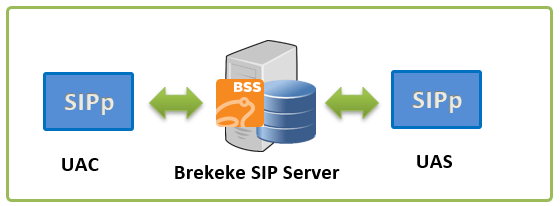SIPp : uac.xml, uas.xml ファイル記述例
ここではSIPpを負荷テストに使用する際の実際のコマンド例と使用するuac.xml / uas.xmlファイルを紹介します。
シナリオ:
このシナリオでは60calls/秒でコールが確立され、各コールは60秒間通話を維持します。同時3600通話をシミュレートします。
また、SIPサーバー(172.16.200.101)を介してUAC/UASはRTPパケットの交換を行います。

SIPpコマンド例 : UAC側 (172.16.200.80)
./sipp -sf uac.xml -d 10000 -s 4000 172.16.200.101 -i 172.16.200.80 -r 60 -m 30000
SIPpコマンド例 : UAS側 (172.16.200.90)
./sipp -sf uas.xml -d 0 -p 5060 -i 172.16.200.90 -rsa 172.16.200.101:5060 -l 6000
UAC.XMLファイル例 : uac.xml
このuac.xmlはSIP ユーザー”test_1000“をUACとしてSIPpでシミュレートする際に利用する例です。また、通話が確立後、オーディオファイル”test_audio.wav“を利用して60秒間オーディオ(RTPパケット)を送出します。
<?xml version="1.0" encoding="ISO-8859-1" ?> <!DOCTYPE scenario SYSTEM "sipp.dtd"> <!-- This program is free software; you can redistribute it and/or --> <!-- modify it under the terms of the GNU General Public License as --> <!-- published by the Free Software Foundation; either version 2 of the --> <!-- License, or (at your option) any later version. --> <!-- --> <!-- This program is distributed in the hope that it will be useful, --> <!-- but WITHOUT ANY WARRANTY; without even the implied warranty of --> <!-- MERCHANTABILITY or FITNESS FOR A PARTICULAR PURPOSE. See the --> <!-- GNU General Public License for more details. --> <!-- --> <!-- You should have received a copy of the GNU General Public License --> <!-- along with this program; if not, write to the --> <!-- Free Software Foundation, Inc., --> <!-- 59 Temple Place, Suite 330, Boston, MA 02111-1307 USA --> <!-- --> <!-- Sipp 'uac' scenario with pcap (rtp) play --> <!-- --> <scenario name="UAC with media"> <!-- In client mode (sipp placing calls), the Call-ID MUST be --> <!-- generated by sipp. To do so, use [call_id] keyword. --> <send retrans="500"> <![CDATA[ INVITE sip:[service]@[remote_ip]:[remote_port] SIP/2.0 Via: SIP/2.0/[transport] [local_ip]:[local_port];branch=[branch] From: test_1000 <sip:test_1000@[local_ip]:[local_port]>;tag=[call_number] To: sut <sip:[service]@[remote_ip]:[remote_port]> Call-ID: [call_id] CSeq: 1 INVITE Contact: sip:test_1000@[local_ip]:[local_port] Max-Forwards: 70 Subject: Performance Test Content-Type: application/sdp Content-Length: [len] v=0 o=user1 53655765 2353687637 IN IP[local_ip_type] [local_ip] s=- c=IN IP[local_ip_type] [local_ip] t=0 0 m=audio [auto_media_port] RTP/AVP 8 a=rtpmap:8 PCMA/8000 a=rtpmap:101 telephone-event/8000 a=fmtp:101 0-11,16 ]]> </send> <recv response="100" optional="true"> </recv> <recv response="180" optional="true"> </recv> <!-- By adding rrs="true" (Record Route Sets), the route sets --> <!-- are saved and used for following messages sent. Useful to test --> <!-- against stateful SIP proxies/B2BUAs. --> <recv response="200" rtd="true" crlf="true"> </recv> <!-- Packet lost can be simulated in any send/recv message by --> <!-- by adding the 'lost = "10"'. Value can be [1-100] percent. --> <send> <![CDATA[ ACK sip:[service]@[remote_ip]:[remote_port] SIP/2.0 Via: SIP/2.0/[transport] [local_ip]:[local_port];branch=[branch] From: test_1000 <sip:test_1000@[local_ip]:[local_port]>;tag=[call_number] To: sut <sip:[service]@[remote_ip]:[remote_port]>[peer_tag_param] Call-ID: [call_id] CSeq: 1 ACK Contact: sip:test_1000@[local_ip]:[local_port] Max-Forwards: 70 Subject: Performance Test Content-Length: 0 ]]> </send> <!-- Play a pre-recorded PCAP file (RTP stream) --> <nop> <action> <exec rtp_stream="test_audio.wav"/> </action> </nop> <pause milliseconds="60000"/> <!-- The 'crlf' option inserts a blank line in the statistics report. --> <send retrans="500"> <![CDATA[ BYE sip:[service]@[remote_ip]:[remote_port] SIP/2.0 Via: SIP/2.0/[transport] [local_ip]:[local_port];branch=[branch] From: test_1000 <sip:test_1000@[local_ip]:[local_port]>;tag=[call_number] To: sut <sip:[service]@[remote_ip]:[remote_port]>[peer_tag_param] Call-ID: [call_id] CSeq: 2 BYE Contact: sip:test_1000@[local_ip]:[local_port] Max-Forwards: 70 Subject: Performance Test Content-Length: 0 ]]> </send> <recv response="200" crlf="true"> </recv> <!-- definition of the response time repartition table (unit is ms) --> <ResponseTimeRepartition value="10, 20, 30, 40, 50, 100, 150, 200"/> <!-- definition of the call length repartition table (unit is ms) --> <CallLengthRepartition value="10, 50, 100, 500, 1000, 5000, 10000"/> </scenario>
UAS.XMLファイル例 : uas.xml
このファイルは通話確立後、”test_audio2.wav“ファイルを使用してオーディオ(RTPパケット)を送出するシナリオとなっています。
<?xml version="1.0" encoding="ISO-8859-1" ?> <!DOCTYPE scenario SYSTEM "sipp.dtd"> <!-- This program is free software; you can redistribute it and/or --> <!-- modify it under the terms of the GNU General Public License as --> <!-- published by the Free Software Foundation; either version 2 of the --> <!-- License, or (at your option) any later version. --> <!-- --> <!-- This program is distributed in the hope that it will be useful, --> <!-- but WITHOUT ANY WARRANTY; without even the implied warranty of --> <!-- MERCHANTABILITY or FITNESS FOR A PARTICULAR PURPOSE. See the --> <!-- GNU General Public License for more details. --> <!-- --> <!-- You should have received a copy of the GNU General Public License --> <!-- along with this program; if not, write to the --> <!-- Free Software Foundation, Inc., --> <!-- 59 Temple Place, Suite 330, Boston, MA 02111-1307 USA --> <!-- --> <!-- Sipp default 'uas' scenario. --> <!-- --> <scenario name="Basic UAS responder"> <!-- By adding rrs="true" (Record Route Sets), the route sets --> <!-- are saved and used for following messages sent. Useful to test --> <!-- against stateful SIP proxies/B2BUAs. --> <recv request="INVITE" crlf="true"> </recv> <!-- The '[last_*]' keyword is replaced automatically by the --> <!-- specified header if it was present in the last message received --> <!-- (except if it was a retransmission). If the header was not --> <!-- present or if no message has been received, the '[last_*]' --> <!-- keyword is discarded, and all bytes until the end of the line --> <!-- are also discarded. --> <!-- --> <!-- If the specified header was present several times in the --> <!-- message, all occurences are concatenated (CRLF seperated) --> <!-- to be used in place of the '[last_*]' keyword. --> <send> <![CDATA[ SIP/2.0 180 Ringing [last_Via:] [last_From:] [last_To:];tag=[call_number] [last_Call-ID:] [last_CSeq:] Contact: <sip:[local_ip]:[local_port];transport=[transport]> Content-Length: 0 ]]> </send> <send retrans="500"> <![CDATA[ SIP/2.0 200 OK [last_Via:] [last_From:] [last_To:];tag=[call_number] [last_Call-ID:] [last_CSeq:] Contact: <sip:[local_ip]:[local_port];transport=[transport]> Content-Type: application/sdp Content-Length: [len] v=0 o=user1 53655765 2353687637 IN IP[local_ip_type] [local_ip] s=- c=IN IP[media_ip_type] [media_ip] t=0 0 m=audio [media_port] RTP/AVP 0 a=rtpmap:0 PCMU/8000 ]]> </send> <recv request="ACK" optional="false" rtd="true" crlf="true"> </recv> <!-- Play a pre-recorded PCAP file (RTP stream) --> <!-- Pause 8 seconds, which is approximately the duration of the --> <!-- PCAP file --> <nop> <action> <exec rtp_stream="test_audio2.wav"/> </action> </nop> <recv request="BYE"> </recv> <send> <![CDATA[ SIP/2.0 200 OK [last_Via:] [last_From:] [last_To:] [last_Call-ID:] [last_CSeq:] Contact: <sip:[local_ip]:[local_port];transport=[transport]> Content-Length: 0 ]]> </send> <!-- Keep the call open for a while in case the 200 is lost to be --> <!-- able to retransmit it if we receive the BYE again. --> <pause milliseconds="4000"/> <!-- definition of the response time repartition table (unit is ms) --> <ResponseTimeRepartition value="10, 20, 30, 40, 50, 100, 150, 200"/> <!-- definition of the call length repartition table (unit is ms) --> <CallLengthRepartition value="10, 50, 100, 500, 1000, 5000, 10000"/> </scenario>
関連リンク:

